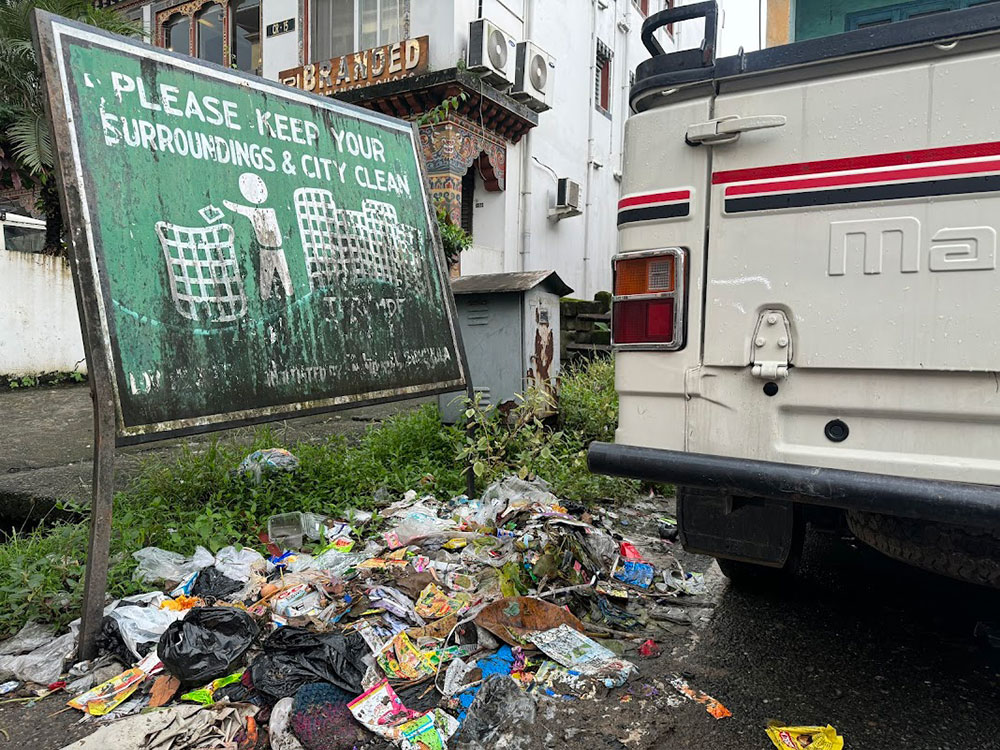CCTV cameras have failed to curb littering and dumping of garbage in public space
Lhakpa Quendren
Phuentsholing—The country’s commercial capital, Phuentsholing, continues to grapple with widespread littering and illegal disposal of waste, with large heaps of garbage strewn across various parts of the city.
This waste is not only a source of stench but also an eyesore.
The irony is that a large dump of garbage has been thrown around the cleanliness Notice Board at the parking area near Gadhen Hotel.
Local business owners deny littering the area and accuse late night dumpers and passersby for creating the mess.
Kanchi Raini, a restaurateur, said that disposing of trash near the restaurant creates an unhygienic environment. “Customers think we are responsible for the garbage. We need stricter surveillance to tackle this issue effectively,” she said.
She frequently cleans the area herself each morning, only to find it littered again the next day.
Dik Bahadur, a feed supplier, said that it is common for some shopkeepers to leave their waste near other shops or in public areas at night while heading home. “This makes it even more difficult to keep our own surroundings clean.”
Some residents alleged that thromde’s waste collection trucks often do not collect waste left by the roadside.
Waste collection is managed by two contractors while the thromde office oversees waste management.
Phuentsholing thromde is taking steps to address these problems. With support from the UNDP, the thromde has installed 17 CCTV cameras to monitor illegal dumping of waste. This is because the lengthy protocols for obtaining footage from the Royal Bhutan Police have been a challenge, as they focus on criminal activities.
Phuentsholing thrompon Uttar Kumar Rai said that the additional CCTV cameras have helped reduce illegal dumping. “We have imposed penalties on several instances of illegal dumping, including some repeat offenders,” he said. The daily amount of waste has decreased from nine metric tonnes to 7.2 metric tonnes over the years.
The thrompon said that low participation during the monthly ‘zero waste hour’ is a main challenge, which undermines collective efforts. “Addressing the waste issue is a shared responsibility involving everyone,” he said.
He urged residents to report littering to the thromde, stressing that without public cooperation, even the most robust systems will fall short of achieving zero waste.
Meanwhile, the medical waste incinerator at Pekarzhing Landfill is expected to be operational soon, once the Department of Environment and Climate Change installs the spare parts. The facility has remained idle for over a year after being used only three times since its installation.
The incinerator is designed to handle 300 kilogrammes (kg) of waste per cycle. The department has installed three incinerators—one each in Thimphu, Mongar, and Phuentsholing—with funding support from UNDP amounting to USD 374,000.
However, thromde officials said the lack of standard operating procedure and insufficient trained personnel affected the sustainable operation of the machine.
An official said that incinerating waste is costly due to the need for both electricity and fossil fuels. The facility incinerated about 900 kg of waste after installation, costing around Nu 10,000. “The cost of fuel is very high,” said the official, adding that the expense has made sustainable operation challenging.


